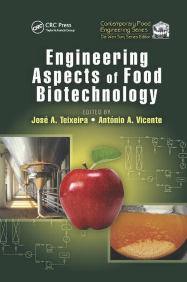Engineering Aspects of Food Biotechnology
Material type: TextLanguage: English Series: Contemporary Food Engineering SeriesPublication details: Boca Raton, FL : CRC Press, 2017Description: XXI, 463 p. : illISBN:
TextLanguage: English Series: Contemporary Food Engineering SeriesPublication details: Boca Raton, FL : CRC Press, 2017Description: XXI, 463 p. : illISBN: - 9781138199767
- 664.024 TIE
| Item type | Current library | Shelving location | Call number | Copy number | Status | Date due | Barcode |
|---|---|---|---|---|---|---|---|
 Reference Collection
Reference Collection
|
Reference Section | Department of Food Engineering | 664.024 TIE | 2022-23 | Available | 98044 |
SUMMARY:
Food biotechnology’s typical developments and applications have occurred in the fields of genetics and in enzyme- and cell-based biological processes, with the goal of producing and improving food ingredients and foods themselves. While these developments and applications are usually well reported in terms of the underlying science, there is a clear lack of information on the engineering aspects of such biotechnology-based food processes. Filling this gap, Engineering Aspects of Food Biotechnology provides a comprehensive review of those aspects, from the development of food processes and products to the most important unit operations implied in food biotechnological processes, also including food quality control and waste management.
The book focuses on the use of biotechnology for the production of ingredients to be used in the food industry. It addresses two relevant issues—consumer’s awareness of the relation between nutrition and good health and the importance of environmental sustainability in the food chain (i.e. production of polymers and in vitro meat). A chapter on the application of process analytical technology highlights the importance of this tool for satisfying the increasingly sophisticated and strict polices for quality control and monitoring of specific process phases. The book includes a detailed presentation of relevant unit operations developed to extract/purify the ingredients of biotechnological origin intended for food applications.
In addition to examining the contributions of biotechnology to producing and improving food ingredients, the book provides a concise description of the role biotechnology plays in adding value to food processing by-products, including post-harvest losses, in relevant industries of the food sector. It builds a foundation for further research and development in the food processing industry.
